The AMD Ryzen 5 1600X vs Core i5 Review: Twelve Threads vs Four at $250
by Ian Cutress on April 11, 2017 9:00 AM ESTBenchmarking Performance: CPU Office Tests
The office programs we use for benchmarking aren't specific programs per-se, but industry standard tests that hold weight with professionals. The goal of these tests is to use an array of software and techniques that a typical office user might encounter, such as video conferencing, document editing, architectural modelling, and so on and so forth. At present we have two such tools to use.
PCMark8
Despite originally coming out in 2008/2009, Futuremark has maintained PCMark8 to remain relevant in 2017. On the scale of complicated tasks, PCMark focuses more on the low-to-mid range of professional workloads, making it a good indicator for what people consider 'office' work. We run the benchmark from the commandline in 'conventional' mode, meaning C++ over OpenCL, to remove the graphics card from the equation and focus purely on the CPU. PCMark8 offers Home, Work and Creative workloads, with some software tests shared and others unique to each benchmark set.
Chromium Compile (v56)
Our new compilation test uses Windows 10 Pro, VS Community 2015.3 with the Win10 SDK to combile a nightly build of Chromium. We've fixed the test for a build in late March 2017, and we run a fresh full compile in our test. Compilation is the typical example given of a variable threaded workload - some of the compile and linking is linear, whereas other parts are multithreaded.
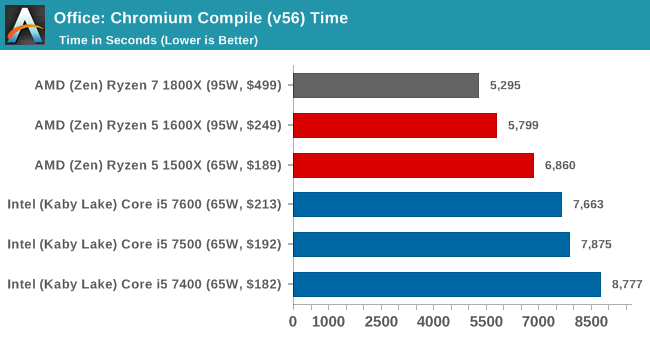
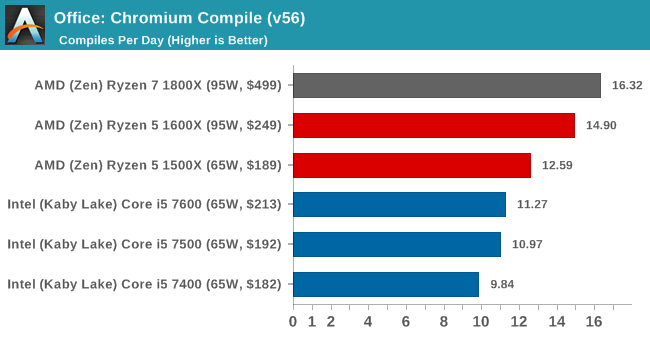
SYSmark 2014 SE
SYSmark is developed by Bapco, a consortium of industry CPU companies. The goal of SYSmark is to take stripped down versions of popular software, such as Photoshop and Onenote, and measure how long it takes to process certain tasks within that software. The end result is a score for each of the three segments (Office, Media, Data) as well as an overall score. Here a reference system (Core i3-6100, 4GB DDR3, 256GB SSD, Integrated HD 530 graphics) is used to provide a baseline score of 1000 in each test.
A note on contect for these numbers. AMD left Bapco in the last two years, due to differences of opinion on how the benchmarking suites were chosen and AMD believed the tests are angled towards Intel processors and had optimizations to show bigger differences than what AMD felt was present. The following benchmarks are provided as data, but the conflict of opinion between the two companies on the validity of the benchmark is provided as context for the following numbers.







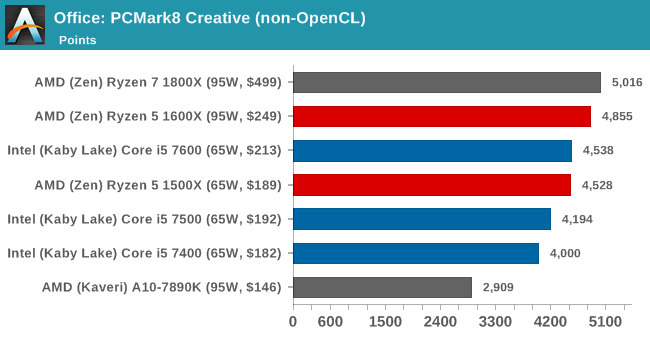
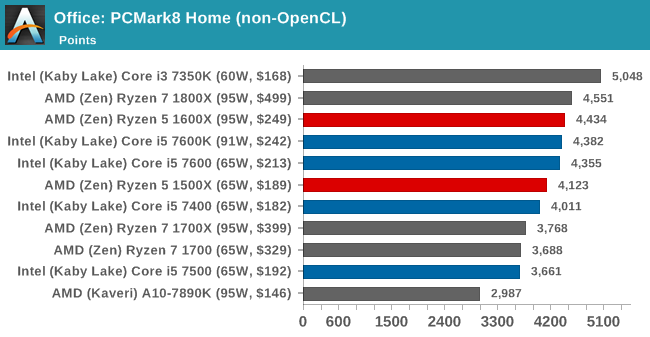
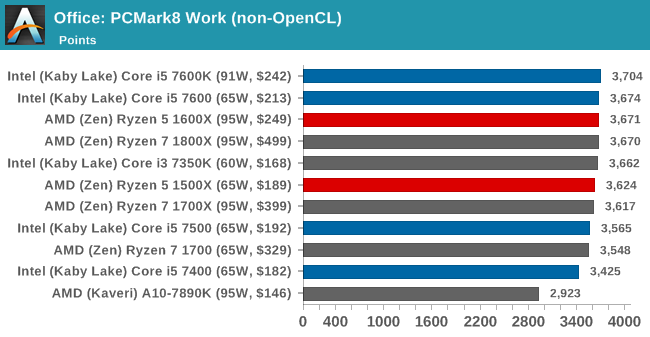








254 Comments
View All Comments
marecki - Tuesday, April 11, 2017 - link
PDF OpeningCan you link this PDF file?
Ratman6161 - Tuesday, April 11, 2017 - link
Hmmm. Food for thought. So I've been sticking with my trusty old i72600K. I use VMWAre workstation to run VM's on my desktop quite a lot. I've always figured a lot of threads were helpful so that VM's and the host OS aren't competing for resources. But the VM's themselves aren't doing anything particularly intense. When not running VM's probably any old i5 level of performance is probably good enough. So...for my particular purposes seems like the Ryzen 5 1600X might be the way to go and save a bunch of money while I'm at it???More than adequate for my desktop needs and more cores/threads than an i7 when running VM's...and way cheaper. First CPU I've seen tht's got me kind of tempted.
cheshirster - Tuesday, April 11, 2017 - link
That's where 1700 might look better.IanHagen - Tuesday, April 11, 2017 - link
I too am a heavy virtualization user and I'd say pick the 1700 if you can. More physical and logical cores are going to make a big difference for you.Ratman6161 - Tuesday, April 11, 2017 - link
I'm actually kind of looking for cheap. The Ryzen 5 1600x is more cores and threads than my trusty old i7-2600K and the 1600x is $140 less than the 1700. I'm actually considering going even cheaper and getting the 1600 instead of the 1600x. The main difference between the 1600 and 1600x seems to be clock speed and...they are unlocked so why not save $30 more and get the 1600?Ratman6161 - Tuesday, April 11, 2017 - link
PS: I'm thinking on going cheap with the CPU and using some of the savings on more RAM.psychobriggsy - Wednesday, April 12, 2017 - link
1600 comes with a cooler, 1600X doesn't, so bear that in mind during price comparisons.IanHagen - Tuesday, April 11, 2017 - link
Then I'd say get the 1600 and overclock it (:lakedude - Thursday, April 13, 2017 - link
Ryzen is not offering much in the way of OC headroom. Sure the chips are unlocked but they are already pushing them pretty hard, unlike the Cel300A from back in the day...Ratman6161 - Thursday, April 13, 2017 - link
True, the OC headroom doesn't seem that great. But for anyone willing to do a mild overclock (which I am) it seems like a no-brainer to choose the 1600 over the 1600x. The only difference seems to be clock speed other than the cooler (which I probably wouldn't use) and I'm betting that even pushing it a bit, the two would end up at the same maximum speed.